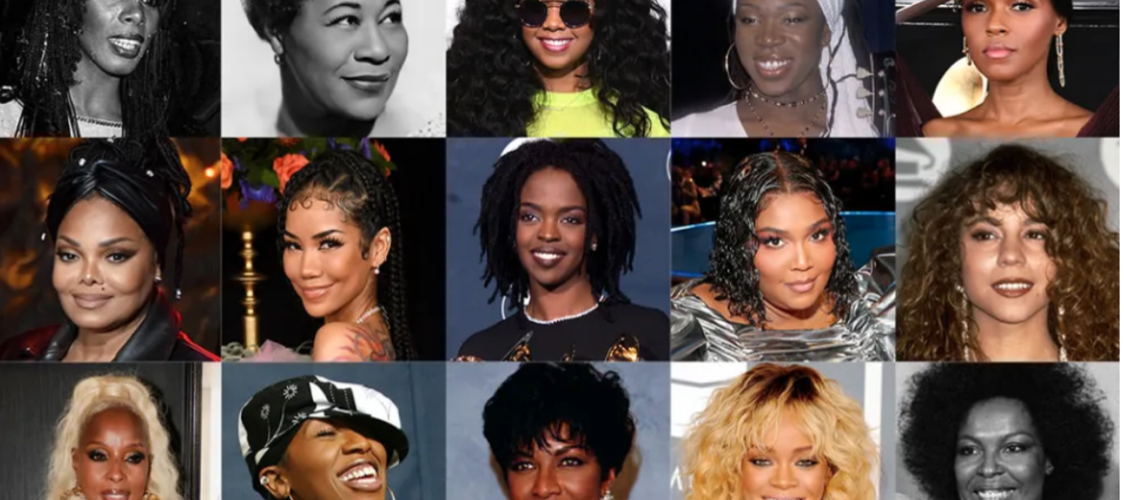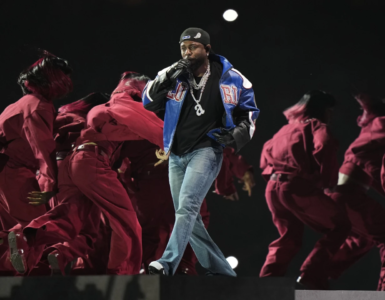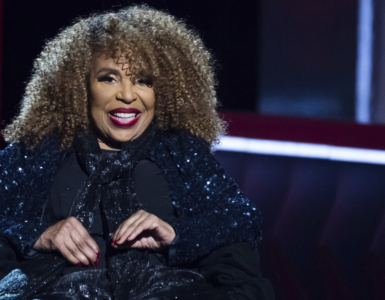Every Black woman whose album has been nominated for Album of the Year since the beginning of the awards show in 1959. | Courtesy of The Hollywood Reporter/Getty Images
At this year’s Grammy Awards ceremony, which took place on Feb. 4 in Los Angeles, Taylor Swift won Album of the Year over SZA, the most nominated artist of the night. While the “Snooze” singer did leave the awards show with three Grammys, none of them were in major categories she was nominated in: Album of the Year, Song of the Year, and Record of the Year. Coupled with Jay-Z’s remarks during his acceptance of the honorary Global Impact Award, this “snub” has sparked conversations yet again about Black women and the double standards they face in the music industry.
In his speech, Jay-Z spoke about the Recording Academy’s lack of inclusion and gave them some constructive criticism:
“We love y’all. We want y’all to get it right,” began the rapper. “I don’t want to embarrass this young lady [Beyoncè], but she has more Grammys than anyone and never won Album of the Year. So even by your own metrics, that doesn’t work.”
The last time a Black woman won Album of the Year – the biggest award of the show – was in 1999 when Lauryn Hill was awarded for “The Miseducation of Lauryn Hill.” Since then, only 23 albums by Black women have been nominated for the honor. None of them have won.
The lack of gramophone-shaped trophies awarded to Black women at this year’s show was “disheartening” for Howard senior Emilie Wilkenson, who plans to attend graduate school for music business.
“My initial reaction to the wins and losses…is one of mixed emotions. While progress has been made, it’s clear that there’s still a long way to go until Black women are truly valued and celebrated for their contributions by institutions like the Recording Academy,” Wilkenson said.
Hannah Jackson, a junior music business major, also shared mixed reactions regarding the awards show. She pinpointed Victoria Monét’s win for Best New Artist— an accolade achieved 15 years into the singer’s career— as a testament to Black women’s experiences in the industry.
“I think about all the other Victoria Monét’s in the world—all the other Black women who’ve received no’s, who have worked just as hard, who have even given up because they weren’t given the opportunity because of their skin color or their hair or the way they looked, despite having that music ability and that work ethic,” she said.
According to the 2023 Global Majority Insight Report, a census conducted by the Musicians’ Union, over half of the musicians who participated in the census reported experiencing high levels of racism. A 2018 study from Berklee and Women In Music found that 78% of women feel that they have been treated differently within the music industry because of their gender. Wilkenson believes the issues of intersectionality and “misogynoir,” which Merriam-Webster defines as the hatred, aversion to, or prejudice against Black women, runs deeper than the awards show itself—there’s a systemic root to this weed.
“Black women continue to face disparities within the Recording Academy due to systemic biases deeply ingrained in the music industry,” Wilkenson said. “Despite their undeniable talent and contributions, they are often overlooked or undervalued, requiring them to exceed expectations just to be considered on par with their white and male counterparts.”
Jackson believes that better representation in C-Suite, or senior executive, positions is necessary to counter the biases Black women are subject to in the industry. She explained, “We need more Black women that are decision-makers in those high places. DEI (diversity, equity, and inclusion) is so important and necessary in this industry. People that work in DEI are cultural bridges and this beacon for inclusivity and representation.”.
While concerns about the diversity in the Recording Academy stay prevalent, the organization has been taking action in response to the sentiments. The Academy gained its first Black president in Harvey Mason, Jr., who stepped into the role in 2021. Since then the group has increased its membership of people of color from 24 percent to 38 percent, with 60 percent of the organization’s senior leadership and board members being people of color.
This year’s Grammys also wasn’t completely lacking in representation. The event was a ladies’ night, as only women accepted awards on the telecasted awards show, and the ballot showed record numbers of women nominated in the Album of the Year and Record of the Year categories. Additionally, several Black women received their flowers such as Coco Jones, Tyla, and Samara Joy, who took home two Grammys last year, including Best New Artist.
Despite what some might call strides toward equity, Jackson says it’s important to “take the Grammys with a grain of salt.” She feels as though the history between Black women and the Academy is a direct reflection of society.
“When you think about Black women in the world and other industries, we have to exceed expectations. Black women are not afforded the luxury to be mediocre. If we’re being honest, if it was based off hard work and what was truly deserved, every Grammy winner would be a Black woman,” Jackson said.
The Academy has launched DEI initiatives, such as advisory groups like the Black Music Collective (BMC), which is committed to the advancement and visibility of Black music and artists. The BMC has provided scholarships for HBCU students and implemented other programs to help improve the diversity in the music industry.
The Black Music Collective partnered with Grammy U, the student membership group of the Academy, to host the inaugural HBCU Love tour in 2022. This initiative was not only a talent show where winners received a cash prize and a trip to the 64th Grammy Awards show but also included panels and programs to demystify the Grammy voting process and educate students interested in the industry on different career opportunities. (L-R) Former Academy Secretary/Treasurer Om’Mas Keith; Chair of the Academy Board of Trustees Tammy Hurt; Producer and BMC Honorary Chair Jimmy Jam; CEO Harvey Mason, Jr, Songwriter and Chair of BMC Rico Love; Producer Terry Lewis; and former Academy Co-President Valeisha Butterfield. | Photo courtesy of Music Connection
Music industry veteran and former president of the Philadelphia chapter of the Academy, Dyana Williams, said the points made in Jay-Z’s acceptance speech were “well taken” and emphasized the work the BMC is doing.
“To tell you that there haven’t been biases within the Recording Academy would be a lie. But I’ve also been inside advocating for change. The predominance of the population that votes are people of non-color. So we are, and have for some years, in [an] effort to recruit more members of color, so that the representation of award winners reflects the general population of the people voting,” said Williams. She expressed the need for a Recording Academy that is reflective of the culture it claims to promote.
She goes on to add, “Black music is the flavor—period. I love all music, but I am an advocate specifically for our culture and our music.”
According to a study from the Annenberg Inclusion Initiative, research found 17.7 white male executives for every Black female one. Williams believes we need more Black executives like Clarence Avant and Sylvia Rhone to hold their white counterparts accountable and advocate for Black women in the industry.
“I’ve seen different periods of the industry — the technology, the people, the politics – but they all pretty much remain the same. It is a white male-dominated industry with gatekeepers that are very particular about controlling the industry, only allowing a few Black people to get in, of real importance,” she shared.“There are only a handful of Black women in leadership capacities, but they’re even limited in that capacity because they still have to get a sign-off from a white man.”.
To achieve a more diverse future, the Mother of Black Music Month believes that industry newcomers must act as activists for the cause, saying, “It is your [industry newcomers’] responsibility to advocate just like my generation. We make strides, we get comfortable in that stride, and then relax.”
The next generation of music professionals is ready to step up to the occasion. Once Wilkenson and Jackson enter the industry, they plan to advocate for initiatives that promote diversity and inclusion. Wilkenson shared she sees her future as an “opportunity to advocate for change, amplify the voices of underrepresented artists, and work towards a future where all individuals, regardless of race or gender, are celebrated and afforded equal opportunities to thrive.”
Jackson gave similar remarks, as she hopes to shake the industry through research and analysis. She added that “having Black women representation in all facets of the industry will really help us create change.”
With these recent conversations about inclusion and the work of groups like BMC, there is hope for a future where more Black women will walk onto the Grammys stage to win the Academy’s highest honor. Until then, there is still work to be done.










Recent Comments